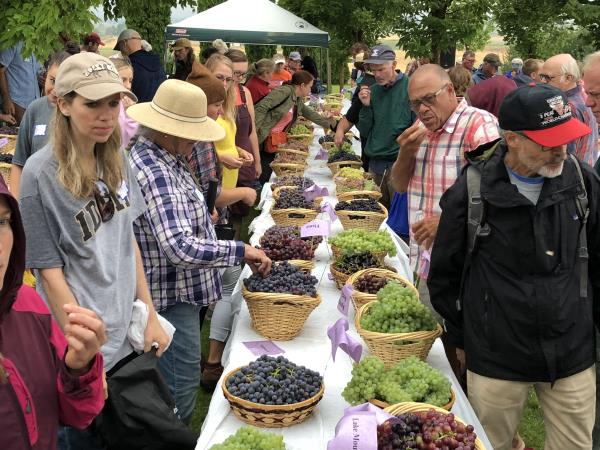Rain doesn't stop turnout for Fruit Field Day

By Sean Ellis
Idaho Farm Bureau Federation
PARMA – A major rainstorm didn’t stop hundreds of people from attending University of Idaho’s annual Fruit Field Day Sept. 6 at the Parma Research and Extension Center.
And although the rain caused the usual four-hour event to be significantly shortened this year, the thousands of pieces of fruit laid out on long display tables disappeared quickly once participants were given the OK to dig in.
The event draws several hundred people from the community and around the Pacific Northwest and participants include commercial and small fruit growers as well as home gardeners, horticultural professionals, fruit industry representatives, researchers and graduate students.
The rain shortened this year’s event but the turnout was about the same as past years.
“What a great event,” new U of I President C. Scott Green said later. “I loved it and thought it was amazing. The fruit was fantastic and I was impressed by the quality.”
Green told event participants who ducked under the cover of tents, trees and umbrellas during a rainstorm, that the university fully supports the Parma station, which, in addition to fruit research, conducts research on a wide variety of field crops, including potatoes, onions, hops, wheat and beans.
He said it was obvious the community supports the Parma station as well, as evidenced by the turnout despite the rainstorm.
“We believe in this center; Parma is really important to us,” he said. “You being out here despite this rain shows you care also.”
Michael Parrella, the dean of U of I’s College of Agricultural and Life Sciences, which oversees the Parma station, said the fruit field day “is a very special event, as you all know. The job it takes to grow this quality of fruit and the effort it takes to put on this type of event … is not a trivial thing.”
During this year’s abbreviated event, Green and Parrella applauded fruit researcher Essie Fallahi, who heads the university’s pomology program and oversees the Parma station’s fruit orchard, for the work he has done over the decades in researching different fruit varieties and helping develop best growing practices for Idaho fruit growers.
Fallahi’s pomology program – pomology is the science of fruit growing –conducts research on new and alternative fruit varieties as well as fruit nutrition, irrigation, pest and disease control, production and orchard mechanization methods, pesticide application and new rootstocks and architectures.
Fallahi, who joined U of I in 1990 and founded the university’s pomology and viticulture programs, has developed many of the production methods currently used by Idaho’s commercial fruit growers and many of the varieties grown in those orchards were first researched by Fallahi.
Fallahi said his top priority is “to find out what the needs of the growers are and figure out how to address them.”
He said the state’s fruit industry has grown in quality and reputation to the point that “in many countries, they ask for Idaho fruit by name.”
Idaho fruit is exported to more than 50 countries and some of the fruit grown here includes apples, peaches, wine and table grapes, plums and nectarines.
The Parma station’s pomology program is also researching several possible alternative fruits and nuts to see if they can be grown economically in Idaho’s climate and soil conditions. Those include walnuts, almonds, quince, Asian pears, jujube and haskap.
Parrella said the health of Idaho’s fruit industry “is really a credit to what Essie has done,” and Green said Fallahi “is at the forefront of his industry.”
Fallahi recently received the American Pomological Society’s highest honor, the Wilder Medal.
According to the association’s award presentation letter, Fallahi received the medal because of his contributions in the fields of fruit germplasm, fruit nutrition, rootstock physiology, bio-regulators and blossom thinners.
He has published more than 250 articles and delivered more than 210 lectures nationally and internationally.
In a support letter, fellow fruit researcher Desmond Lane called Fallahi “a true, international ambassador for the science and practice of pomology … The American Pomological Society is better because of him and he has left an enduring mark.”
Still can't find what you are looking for? Find by topic:
- County Presidents & Board Information
- County Resource Page
- Delegate Form
- Discount Programs
- Discussion Meet
- Discussion Meet - High School
- Education Programs
- Events
- Excellence Award (YF&R)
- Expense Voucher
- Flickr- Photos
- Gem State Producer
- High School Discussion Meet
- High School Speech Contest
- Hope in Idaho Ag
- House of Delegates Credentials Form
- IFBF Board of Directors
- IFBF Staff
- Insurance
- Issue Advisory
- Legislative Action Program
- Legislative Issues
- Library
- MAC Trailer
- Magazines
- Map My Benefits
- Member Benefits
- Member Discount
- Membership Application
- Mental Health Resources
- Mission Statement
- Moving Agriculture to the Classroom
- Newsletter Sign up
- News Releases
- News Room
- Open Range Law
- Photo Contest
Thank You to Our Partners









